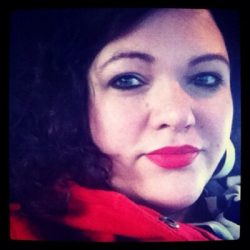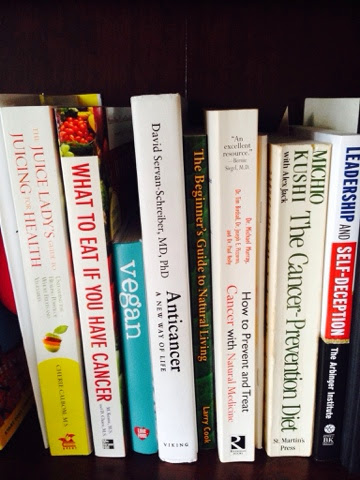Let’s start with one thing. I am not a doctor. I am also not a nutritionist, a dietitian, or an expert of any kind on the topic of cancer and diet. So I’m not trying to tell you what to eat or what products to use or not use if you have cancer. What I am doing is sharing what I have decided to do, after concluding that diet may affect cancer, speaking to two dietitians, a nutritionist, numerous cancer survivors and my doctor, and reading a crapload of books and blogs and such on the topic.
A lot of what I say here comes from the above books, especially the Anti-Cancer Lifestyle. I found it to be practical and balanced.
This is what I’m thinking and what I’m doing. Not a recommendation, necessarily. Some people would never give up some of the things I’ve given up and some people will think I’m not strict enough. To some people this is shocking info and to some it’s familiar and almost common sense. I’m not trying to be critical or directive. It’s just, well, food for thought.
Some interesting info:
Cancer rates have increased sharply since 1940. Here are some other things that have happened since then:
Huge increase in refined sugar in our diets – In the 1800s sugar was a rare treat. Today the average western diet contains 154 pounds of refined sugar per year (!!!). That is cuh-razay. And gross.
Changes in farming, therefore changes to our food (factory farming. Cows used to eat grass on farms. A natural food rich in omega-3 fatty acids (the good kind.) increase in demand has led to farmers taking shortcuts. Now cows eat corn and soy and wheat. These have omega-6 fatty acids (the bad kind.) So your beef and milk has fatty acids that prompt inflammation, instead of the fatty acids that reduce inflammation. Inflammation is widely acknowledged as a pre-cursor to cancer.
Introduction of processed foods and trans fats. Hydrogenated oils like vegetable oil are omega-6 oils. They are in most pre-packaged foods currently but did not exist prior to WWII.
Exposure to chemicals that did not exist prior to 1940. (100,000+ chemicals released by industry since then.) Flame retardants, pesticides, dyes, detergents, etc. One 1995 study tested a representative sample of the approx 75,000 substances on the market at that time and concluded that 5-10% should be considered “carcinogens.” From dry cleaning, to household cleaners to shampoo – there’s some icky stuff out there.
So. What to do??? It’s overwhelming. I know. But here is what I am doing in response to the information I have gathered.
I avoid refined sugar as much as I can without going crazy. My mom is making a chocolate cake tonight and I will probably eat some. I received some Belgium truffles and you know I went to town on those. But I do not mindlessly pick at candy, cookies or put sugar in anything. I use agave for things like salad dressings and if I were to bake I would use coconut sugar. I buy products like jam with no added sugar. Artificial sweeteners are basically poison so I don’t use those at all. Stevia is natural but I think it’s gross so I don’t use it.
I primarily eat only organic meat and animal products. I’ve cut out milk, creamer and butter and use almond milk, soy cream and an olive oil product instead. I very rarely eat red meat now. Special occasions only (like corned beef for St. Patty’s day!) i typically do not eat meat for breakfast or lunch and even try to make those two meals vegan as often as I conveniently can. I cannot give up cheese – it’s just not happening. But I have cut back on it and try to buy organic.
I do not use oils except for olive oil for salads and coconut oil for cooking. I do not buy very many pre-packaged, processed foods. The only frozen things I buy are fish, veggies and an occasional ice cream related treat.
I do not microwave anything plastic.
I avoid most heavy duty cleansers. I replace with Method or Meyers brand or plain white vinegar.
I only use regular anti-perspirant if I’m doing something physical with others out of courtesy, lol. I use a natural deodorant otherwise.
I’m slowly switching my body products and cosmetics over to organic. I do not use dry cleaning.
So that’s mostly stuff I DON’T do. Here’s what I DO do.
I primarily buy organic produce although items with a tough outer skin like pineapple or oranges I don’t worry about as much. I eat a LOT of green things: kale, spinach, cukes, chard, arugula, etc. these contain cancer fighting anti oxidants.
Other anti-cancer foods:
Sweet potatoes
Quinoa
Flaxseed
Turmeric
Garlic
Citrus
Tomatoes
Tofu
Celery
Beets
Whole grain bread, pasta
Green tea
Red wine (woohoo!)
Filtered/bottled water (never leave bottles in the car/sun!)
I get as much physical activity as I can. Chemo had made this hard. But exercise fights cancer! The more, the better.
I am working on addressing my stress levels. Stress feeds cancer. Prayer, yoga, meditation, the Spa station on Sirius/XM.
This is in no way comprehensive. There are theories about wheat, gluten and carbs. Theories about diets being too acidic and the need for a more alkaline diet. Many people say zero animal products is the way to go. Some say more meat, but no grains. Some say cell phones and all of the electronics are a factor. I do some things in response to those theories but I haven’t bought fully in to any of them.
I hope this was helpful or at least interesting. Thanks for reading.



I'm fairly well-versed in this stuff, but found your post to be concise, insightful, and well-balanced. Thank you for sharing!
Good day, I love LoL! For this reason I’m in love with amazing blog.